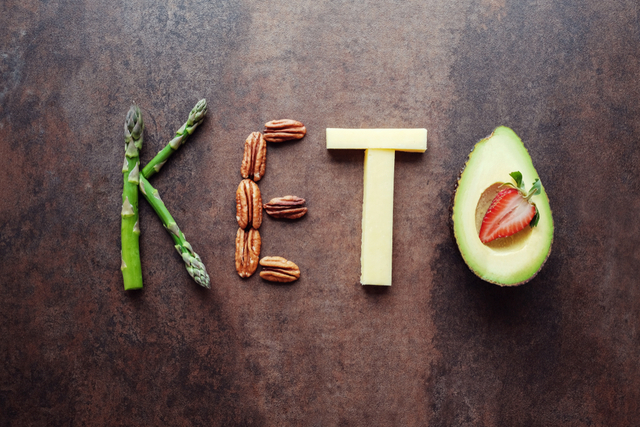At Pathways, we advocate a low carbohydrate diet to restore metabolic and hormonal health and as an anti-ageing measure. In general, however, I do tailor my recommendation to a person’s health issues and for certain patients, I recommend a ketogenic diet. A ketogenic diet primarily consists of high-fats, moderate-proteins, and very-low-carbohydrates. The dietary macronutrients are divided into approximately 55% to 60% fat, 30% to 35% protein and 5% to 10% carbohydrates. Specifically, in a 2000 kcal per day diet, the carbohydrate limit is between 20 to 50g per day.
Sugar burner vs fat burner
Like a hybrid car, cells can utilize alternative fuels: glucose and fat.
In a ketogenic diet, the body burns fat as fuel instead of sugar from carbohydrates. Then the liver begins producing ketone bodies— acetoacetate, acetone, and beta-hydroxybutyrate. The ketogenic diet is one that results in the metabolic state whereby the majority of the body’s energy is derived from ketone bodies in the blood. This metabolic state is called ‘ketosis’, or ‘nutritional ketosis’ to be exact. The ketone bodies fuel mitochondria in the cells and they can cross the blood-brain barrier and fuel the brain.
This is in contrast to the state of burning sugar (glycolysis) in the modern human condition where blood glucose provides the majority of the energy supply. It is now well known that sugary, starchy diets are major sources of inflammation.
The ketogenic diet is not new, fat has been a most valuable nutrient for humans throughout 2.5 million years of evolutionary history and primitive men before the agricultural revolution had the ability to burn fats as their principal fuel through exposure to feast and fast (starvation). We have lost touch with the benefits of the metabolic state of ketosis, which is the original human condition and of which our genome is established. We are now paying the price dearly.
A person who is ‘keto-adapted’ is able to switch from burning sugar and carbohydrates as a source of fuel to burning fat and fibre, which gives much longer-lasting clean energy and stamina.
During the starvation period, Ketosis is the normal response to limited food accessibility with the body accessing and relying on its own fat stores. Scientists have discovered that a high-fat diet can create nutritional ketosis without causing starvation. Ketogenic diets have been shown to have remarkable benefits for a number of serious health problems, such as neurological problems, autoimmune diseases, metabolic disorders such as diabetes and even cancer.
Ketogenic Benefits
A ketogenic diet can improve your health in many ways primarily by lowering inflammation and improving mitochondrial energy output. It can lower your risk of acquiring many chronic diseases and drastically improve your life from cellular, gene level!
To ensure maximum benefits, I like to recommend a palaeolithic whole food ketogenic diet that is high in HEALTHY fats (avoid dirty fats at all costs!), clean-sourced proteins, and good amount of antioxidant-rich vegetables and herbs. Flooding the body with dense nutrients along with a ketogenic diet is where it truly becomes therapeutic and healing.
Reduced inflammation, blood sugar, insulin
One of the most profound benefits of a ketogenic diet is that it drastically lowers inflammation. This is mainly due to the reduced amount of free radical production that occurs when burning ketones for energy instead of glucose. Less inflammation allows for more energy production and an overall more efficiently functioning body. This allows for a heightened ability of the body to heal in many different aspects.
Another reason that a ketogenic diet is so anti-inflammatory is that it allows blood sugar and insulin to stabilize. Blood sugar imbalance is one of the most pervasive inflammatory activities present in the bodies of people who are heavily relying on sugar for energy. Our anti-ageing and hormone rejuvenation programme also begin with blood sugar regulation and the recovery of insulin sensitivity from insulin resistance. This provides an enormously positive backdrop of metabolic health for fertility and pregnancy outcome.
Improved Fat Burning
By definition, being in a state of ketosis means burning fat for energy. If you have excess body fat, you will be able to access fat storage and burn it at a much more efficient rate. At Pathways, our clients are losing weight not by running or exercising for long hours, they lose weight by being in ketosis.
Being overweight is a hallmark of metabolic derangement and a risk factor for various diseases including infertility. Having excess body fat, particularly around the stomach, is associated with hormone imbalances and toxin accumulation in the body. For our patients who have a metabolic fertility problem such as PCOS, a ketogenic diet is extremely beneficial in improving various biomarkers and body composition. Anyone who is considering pregnancy or even attempting IVF is recommended to be fat adapted and weight-optimized through achieving nutritional ketosis. Achieving metabolic health is necessary for a positive pregnancy outcome and for foetal health.
Mental Clarity, Sharpness & Stress Resilience
The brain is composed of 60% fat and is one of the most energy-demanding organs. Many people have exhausted their capacity to produce energy from sugar and a surging insulin level from following a high carbohydrate diet is toxic to the brain tissue. Nowadays neurological inflammation is at epidemic proportions thanks to people’s low fat, high sugar, processed food diets. One of the first benefits you will likely notice when following a ketogenic diet is that your brain feels sharper and clear. By recovering the energy production of the brain, people can recover from depression, anxiety, and poor cognitive function. A low carbohydrate diet has been shown to be beneficial to hypothalamus function, the centre of hormone production. For my patients undergoing very stressful fertility treatment, I often recommend Ketogenic diet for brain benefit of stress resilience and correct functioning of hormones centre.
Increased energy production
Mitochondria are cellular energy factories. When you stabilize blood sugar, you produce less oxidative stress and less inflammation. By burning fat as a fuel, you produce much more ATP per molecule of ketone compared to burning glucose. Mitochondria biogenesis (new growth and division) is upregulated and you enjoy increased amounts of energy and your organs enjoy increased energy output.
Anti-ageing effect of Ketogenic diet
Ageing is among the greatest known risk factors for most human diseases and what constitutes ageing has been debated for a long time. Among many theories around, recently the mitochondrial theory of ageing has emerged. Mitochondria have a profound impact on energy production, inflammation levels, and gene expression (and therefore overall function of the body). Many chronic diseases stem from chronic inflammation and mitochondrial dysfunction so mitochondrial health is foundational in living, ageing and dying. Many anti-ageing strategies such as calorie restriction and fasting appear to be successful because they improve mitochondrial function and numbers.
Thrive, fueled by fat!
In conclusion, a ketogenic diet is a fundamental strategy for mitigating the risk of many of the chronic diseases faced today. As it is excellent for energizing the brain and body, everybody will be able to benefit from being in a state of ketosis. With a healthy metabolism, a constant state of ketosis is unnecessary, but I recommend everyone to become fat-adapted, to utilize fat as a fuel and freely move in and out of ketosis at will.
Dr Ryu’s articles
Is it safe to continue ketosis throughout pregnancy?
Cholesterol, the critical molecule for Fertility
Biological importance of Saturated Fat
Curse of vegetable oil: loss of cellular function, loss of family lineage





